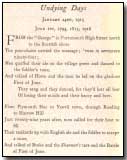Prose & Poetry - The Muse in Arms - Undying Days
 First published in London
in November 1917 and reprinted in February 1918 The Muse in Arms
comprised, in the words of editor E. B. Osborne:
First published in London
in November 1917 and reprinted in February 1918 The Muse in Arms
comprised, in the words of editor E. B. Osborne:
"A collection of war poems, for the most part written in the field of action, by seamen, soldiers, and flying men who are serving, or have served, in the Great War".
Below is one of eight poems featured within the Sea Affair section of the collection. You can access other poems within the section via the sidebar to the right.
Undying Days
by William M. James
January 24th, 1915
June 1st, 1794, 1813, 1916
From the George in
Portsmouth High Street north to the Scottish shore
The post-chaise carried the message; 'twas in seventeen ninety-four;
Men quaffed their ale on the village green and danced to the fiddler's tune,
And talked of Howe and the men he led on the glorious First of June.
They sang and they danced, for they'd lost all fear
Of losing their maids and their baccy and beer.
From Plymouth Hoe to Yeovil
town, through Reading to Harrow Hill
Just twenty-nine years after, men called for their host to fill
Their tankards up with English ale and the fiddler to scrape a tune,
And talked of Broke and the Shannon's tars and the Battle of First of
June.
They danced and they toasted the frigate's crew,
And sang of the guns and the men in blue.
Once more from Plymouth and
Portsmouth towns the news has spread like fire,
Instead of the chaise and its sweating team, it's carried by miles of wire;
Though beer is scarce and tobacco dear, and no fiddlers to give a tune,
Men talk of the fleet that held the field, and prayed for a "First of June."
No song and no dance, but a quiet content
For the news that their great grey ships have sent.
Merchants sailed from the
Port of Leith and passed by the Head of Skaw,
And the sea to them looked all the same from St. Abb's to the Danish shore;
But the skippers knew of the Fisher Bank and the fifteen-fathom patch;
You'd have heard of it too in Jutland, when they talked of the "last night's
catch."
They worked and fished on the slippery decks
With never a thought of gun-swept wrecks.
Travellers sailed from the
Port of Hull to land on Stavanger pier,
And they never looked at the soundings, or thought of the course to steer;
But the skippers knew of the Dogger Bank where the lead can "find" at eight;
You'd have heard of it too at Grimsby town, when the boats were a few days
late.
The packers and fishwives knew it well,
For that's where their men got the fish to sell.
But now the merchants from
Port 0f Leith will ask for the shallow patch,
And the Jutland men will haul their nets, fearing for what they'll catch;
Talking ever of homes that shook when the great grey vessels fought
And a fleet sent out on an enterprise, crippled and back in port.
They'll marvel at men who'll struggle and drown
For the sake of the maids in an East Coast town.
The travellers, too, from
the Port of Hull will ask for the Dogger Bank,
And think of the day the great ships met, and the place where the Blucher
sank;
And talk of the deeds of sailor folk who fought for their homes and trade,
And an enemy baffled by English strength, turned from an East Coast raid.
They'll know they travel because men fought
And skilfully handled what strong men wrought.
Thousands who never have
seen the sea, or the great grey steel-clad forms,
Or the lithe black shapes of the smaller craft, or the scud of the North Sea
storms,
Will talk of armour and shells and guns, and the battle by Horn Reef light,
And of sunken ships and of brave deeds done in the hours of a short May
night.
No song and no dance! - but they've lost the fear
Of losing their maids and their baccy and beer.
'Billy' was the Australian nickname for a cooking-pot or can.
- Did you know?
